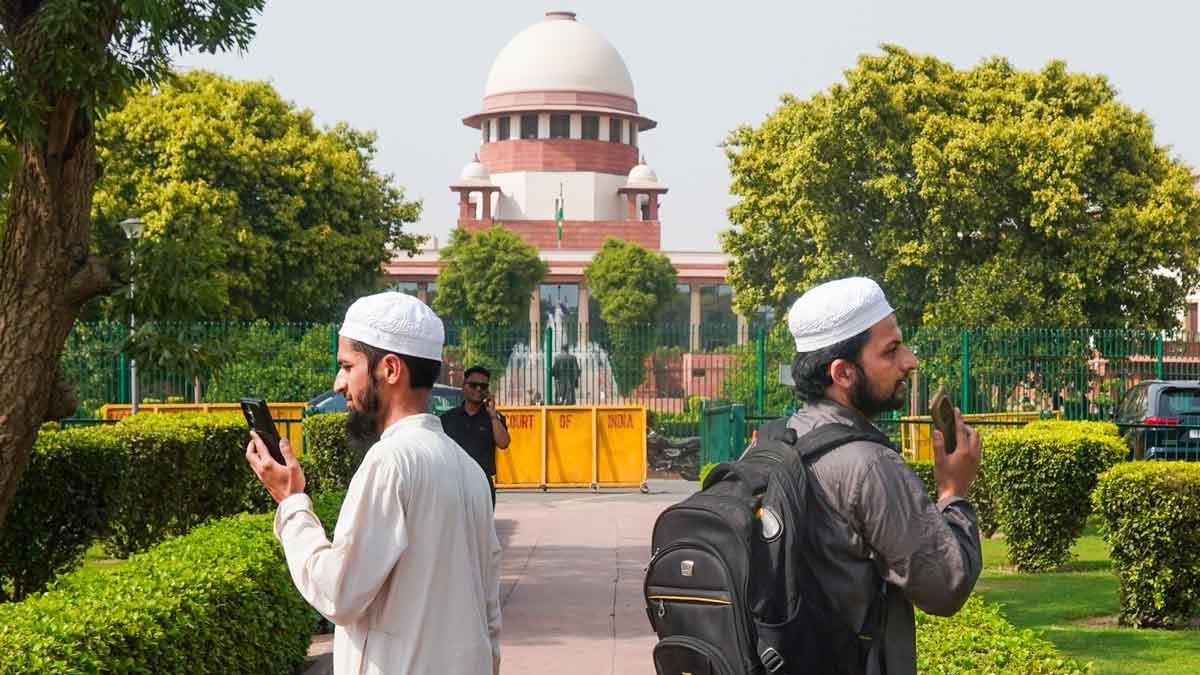'We all strive to reach heaven': Justice Masih as SC reserves order on Waqf Amendment Act
 Muslim petitioners at the Supreme Court lawn during hearing on pleas challenging the Waqf Act amendments | PTI
Muslim petitioners at the Supreme Court lawn during hearing on pleas challenging the Waqf Act amendments | PTI
The Supreme Court on Thursday reserved its judgment on a batch of petitions on the plea to stay the operation of the Waqf (Amendment) Act 2025.
A bench led by Chief Justice B. R. Gavai reserved the order after hearing the arguments for three days and stated that the court would deliver its verdict after thorough deliberation.
The petitions, filed by various Hindu organisations, individual citizens, and property rights advocates, argue that the Act grants unfettered powers to Waqf Boards, allowing them to declare properties as Waqf without due process or judicial scrutiny.
At the heart of the controversy is Section 40 of the Waqf Act, which empowers Waqf Boards to declare a property as Waqf based on historical or documentary evidence. Petitioners contend that this provision is often misused, leading to disputes and land grabbing, especially in cases where the title is contested or ownership has long been established by private parties.
Centre represented by the Solicitor General Tushar Mehta, defended the Act, stating that Waqf properties are religious endowments meant for the welfare of the Muslim community and require a special legal framework for their management and protection. The Centre insisted that there are adequate safeguards under the law, including provisions for appeals and inquiries.
Mehta argued and addressed the concerns about Section 3E, which bars the creation of Waqf over lands falling under Scheduled Areas. SG said that this provision was created for the protection of Scheduled Tribes.
At this, Chief Justice of India Gavai asked about the rationale behind this provision, SG said that the creation of Waqf is irreversible. "JPC says tribals may follow Islam but they have their separate cultural identity," Mehta said.
But Justice Masih expressed disagreement, saying, "Does not appear to be correct. Islam is Islam. Religion is the same."
In response to the Centre’s submissions, senior advocate Kapil Sibal, appearing for the petitioners, told the court, “Waqf is not just charity, it is a permanent dedication to God, made with the intent of spiritual benefit in the afterlife. Unlike charitable acts that are directed toward a community, Waqf is unique in its sacred character. It is an act of devotion meant to serve divine purposes, not merely social welfare.”
Responding to the submissions on the spiritual significance of Waqf, the Chief Justice said, "In Hinduism, there is the concept of Moksha (liberation)."
Justice Augustine George Masih echoed this sentiment, drawing a parallel with Christian theology, remarking, "We all strive to reach heaven."
Countering Centre’s argument, senior advocate Rajeev Dhavan, appearing for the petitioners, pointed out that, as per the Vedas, the concept of temples is not essential to Hinduism. "There are provisions for worshipping elements of nature. The gods of fire, water, rain, these are all part of the Hindu tradition. Reverence extends to mountains, oceans, and other natural forces," he argued, suggesting a more diverse and less centralised form of worship in Hindu philosophy compared to the structured notion of Waqf.
India